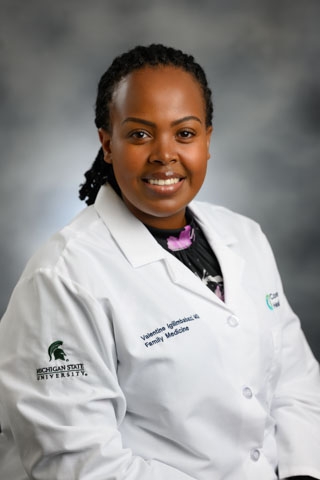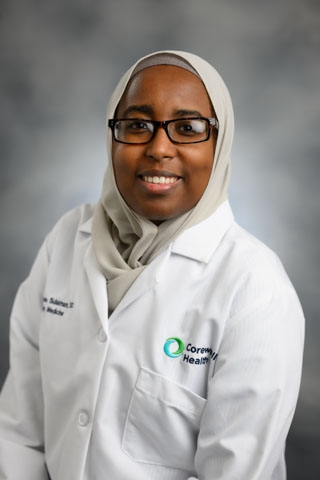Minority and underrepresented scholarship programs

Health Equity and Leadership Scholars Program
The Health Equity and Leadership Scholars Program (HEAL) is an initiative designed to encourage diversity in the physician workforce in Grand Rapids, Michigan by providing scholarships for resident physicians from underrepresented minority backgrounds.
HEAL scholars pursue a health equity project involving leadership, advocacy, scholarship, and/or community engagement. Each scholar is paired with a Corewell Health in West Michigan and Kent County Health Department faculty mentor. Scholars also serve as a mentor for a medical student from an underrepresented background.
Each academic year, two resident physicians are accepted into the program. HEAL Scholars receive a $10,000 scholarship their first year and a $5,000 scholarship each year thereafter throughout residency. Upon graduation, HEAL scholars may be eligible to receive an additional $5,000 if they choose to stay and practice in West Michigan and Corewell Health in West Michigan.
Eligibility
- Scholars must be enrolled in one of Corewell Health - Grand Rapids/Michigan State University College of Human Medicine 3-year primary care residency programs (pediatrics, internal medicine, family medicine) or the emergency medicine residency program.
- Scholars must be from an underrepresented minority background (African American/Black, Hispanic/Latino, American Indian/Alaska Native or Native Hawaiian/Pacific Islander)
How to Apply
Applications are accepted each year after Match Day and until May 1. To apply, complete the application form and email to residentdiversity@corewellhealth.org.
Congratulations to the 2023-2024 Health Equity and Leadership Scholars!
Valentine Igilimbabazi, MD
Family Medicine
As a first-generation immigrant, my initial exposure to health care disparities occurred in my own country, Rwanda, where I witnessed both progress and enduring limitations within the healthcare system. While I deeply admire the progress my country has made in providing healthcare access, my experience at a local women's hospital shed light on the profound impact of various social determinants on the quality of care. Upon relocating to the United States, I observed similar disparities in the treatment of black and brown individuals within the health care system. Given the rapid growth in diversity in West Michigan's population, it is imperative that this population is met with representation in the physician workforce to enhance equity and advocacy. This representation fosters trust between physicians and patients. Additionally, minority and underrepresented physicians are empowered to advocate for patients by leveraging their familiarity with the community, playing a vital role in implementing regulations that serve everyone equally, influencing legislative changes, and reducing implicit bias.


Fatima Sulaiman, DO
Family Medicine
Growing up as a first-generation American with parents who immigrated from East Africa, I've witnessed numerous situations unfold due to limited access to care and cultural misunderstandings. These personal and professional experiences have deeply influenced my passion for health equity and advocacy. During my 4th year of medical school, I was further reminded of this during my family medicine rotation in an area with a large new immigrant population. As a future physician, I am taught to ask the right questions and gather enough information to create the best assessment and treatment plan, however, it is important to keep a patient's life situation and cultural practice in mind. By keeping underrepresented physicians in West Michigan, we can ensure that patients of all backgrounds have access to healthcare providers who truly understand their needs. Moreover, these physicians serve as inspiring figures within underrepresented communities, encouraging more individuals to pursue careers in medicine and thereby increasing the numbers even more.
Minority Visiting Scholars Program
Program overview
The Minority Visiting Scholars Program (MVSP) is sponsored by the Office of Medical Education at Corewell Health in West Michigan as a supplement to our visiting learner program for medical students. MVSP is a specialized away rotation that provides mentoring and networking for fourth year medical students who are underrepresented in medicine.
The mission of MVSP is to enrich medical education, advance research and strengthen clinical care by fostering equity in opportunities. Corewell Health in West Michigan is committed to creating a graduate medical education environment that is inclusive, intersectional and free from bias – both conscious and unconscious. We strive to recruit a resident class that reflects the diversity and intersectionality of our communities.
Highlights
- Scholarship of up to $1,500 scholarship awarded upon completion of rotation
- Four-week rotation on clinical shifts, didactics and simulation with attending physicians and resident physicians
- Opportunities to attend all residency educational activities
- Mentoring opportunities from faculty member in specialty of interest
Applications for the 2024 academic year are now closed.
Racism is a Public Health Crisis
We pledge to take on the challenge to eliminate racism and its impacts on health, hope and lives.
